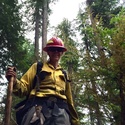A view from the fireground
“I doubt we will solve our climate change problems, unless we learn listen to what the land has to tell us. ”
When I started my fire career in 2001, the West was at the tail end of an 8 year drought cycle. A trend was emerging: Fires were becoming larger, faster moving and more unpredictable. Drought weakened the trees against bark beetles and other parasites, which made them still more vulnerable to fire.
Two points of access to Dutchman Peak lookout in Southern Oregon are normally blocked by snow drifts until late June. McGloughlin and Shasta are ordinarily loaded with snow, and wildflowers and kestrels dart about the mountain.
In 2009, a family of stellar jays hatched in a stunted mountain hemlock 20 feet from the lookout. Cicadas hissed in the rose-gold light of the fading sunsets, and there were more deer, raptors, and more butterflies than I could count. Come late August, the wind-swept mountain mahogany bushes surrounding the cupola developed feathery filaments that the winds would carry off before the cold and rain would settle in for the fall.
In 2012, Newswatch 12 wanted to know the impressions my boss and I had concerning the coming fire season. The moisture readings were at low levels not normally seen until late August. We had never opened the lookout so early before. Once fire season began, the air filled with so much smoke from fires, I woke one night with my chest heavy and tight, wondering if I could asphyxiate in my sleep from lack of oxygen.
In 2013, the changes I noticed caused a hollow fluttering in the pit of my stomach. We opened the lookout two weeks earlier than in the previous year. There were fewer flowers and butterflies than ever. The ladybugs and dragonfly hatches seemed erratic and moisture readings incredibly low. The Mountain Mahogany developed few seed filaments, and I could actually hear the rustling paper sound of foliage drying out in the wind.
In 2014, a month earlier than normal, the snow disappeared from McGloughlin, and, to the shock of many, a glacier melted on Mt Shasta, creating flooding in the nearby valley. The deer, the birds, flowers and butterflies were all but absent.
In 14 years in fire, I’ve heard much about the debate over roles that fire suppression, forest management practices and climate change play in the trend toward more severe fire seasons;
I doubt we will solve our climate change problems, unless we learn listen to what the land has to tell us.








